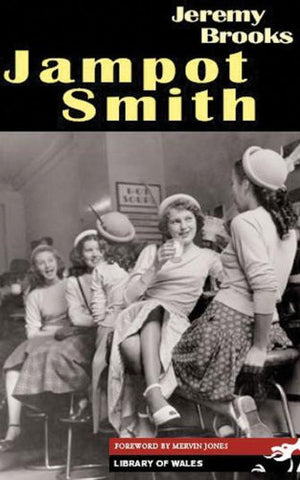"His fiction aspired to, and often achieved, a Chekhovian mixture of comic concision and pathos. Jampot Smith is a small classic about the delight and pain of sexual awakening; it will outlast its period and provincial setting." - Michael Kustow
"Brooks explores ephemeral relationships with delicacy and charm." - The New York Times
"A novel to be savoured…it is hard to suggest the originality, the illumination of this novel about adolescent emotions in years of World War II in simmering Llandudno." - The Times
"Jeremy Brooks has come to considerable stature in Jampot Smith." - Anthony Burgess
Synopsis:
Jampot Smith is story of a group of friends as they edge towards adulthood in the sunshine and shadow of Llandudno during the years of the Second World War.
For Bernard, the eponymous Jampot Smith, Kathy, Epsom and Dewi it is all held in an exquisite balance of emotion and restraint that promises both love and danger. It is a time which will shape their lives against a war which will define it.
About the author:
Jeremy Brooks was born in Southampton in 1926. He was educated at John Bright School in Llandudno, after being evacuated to North Wales in 1940. He enlisted in the Navy and spent time at Magdalen College, Oxford before seeing active service in the Mediterranean. After the war he studied Stage Design at the Camberwell School of Art. He moved back to North Wales in 1953 with his wife, the painter Eleanor Brooks, where they rented a cottage on the estate of Clough Williams Ellis at Llanfrothen. They would have four children. To support himself while writing fiction he occasionally worked as a wine waiter in the restaurant at the Portmeirion Hotel and was later to write a novel, The Water Carnival (1957), satirising the Italianate village. Jampot Smith was published in 1960, Henry’s War in 1962 and Smith as Hero in 1964.
He later embarked on a theatrical career, which included a period as the literary manager of the Royal Shakespeare Company with Peter Hall from 1962 to 1969. He was responsible, with Kitty Hunter-Blair, for a number of ground-breaking adaptations of plays by Russian dramatists including Maxim Gorky and Nikolai Gogol. An adaptation of The Government Inspector, in which Paul Scofield starred, was particularly well received. He worked extensively for theatre, television and radio producing many original works and adaptations including (with Adrian Mitchell), a version of Dylan Thomas’s A Child’s Christmas in Wales. He also wrote poetry, children’s books and worked extensively with Theatr Clywd at Mold, producing a notable adaptation of Medea. He was renowned for helping the careers and development of younger writers and was a founder member of the Theatre Writers’ Union.
His last published work was a collection of short stories, entitled Doing the Voices (1986). He died in 1994.
Short extract:
Throughout our youth in Llandudno, Gregory was ever the nasty prophet of our loves. Like a woman, he seemed to know in advance what shifts might be expected in the changing pattern of our relationships and never failed to heighten the embarrassment of any dying affair by recalling to all parties the accuracy of his earlier predictions. Yet he was himself so socially inept, so clumsy, gauche, obvious, that we regarded him as a sort of clown, placed among us as a warning of what might happen if we, too, took ourselves a little too seriously.

